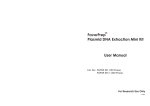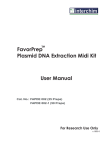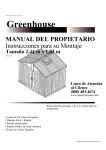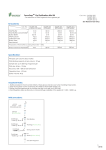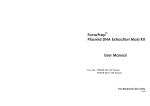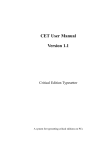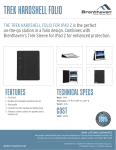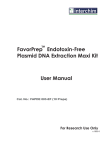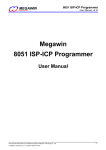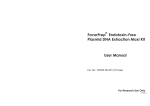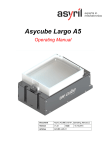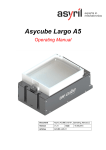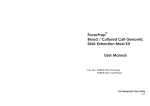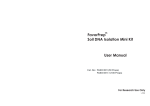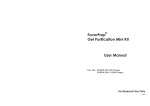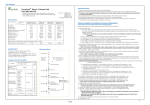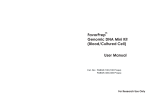Download FavorPrep Plasmid Extraction Mini Kit
Transcript
User Manual: TM FavorPrep Plasmid Extraction Mini Kit Cat. No.: FAPDE 000-Mini (4 preps) FAPDE 001 (100 preps) FAPDE 001-1 (300 preps) (For Research Use Only) Brief procedure: Kit Contents: Cat. No: FAPDE 000-Mini (4 preps_sample) FAPD1 Buffer FAPD2 Buffer FAPD3 Buffer a W1 Buffer (concentrate) b Wash Buffer (concentrate) Elution Buffer FAPD Column Collection Tube RNase A (Lyophilized) User Manual 1.5 ml 1.5 ml 1.5 ml 1.3 ml 1.0 ml 0.5 ml 4 pcs 4 pcs 0.15 mg 1 FAPDE 001 (100 preps) FAPDE 001-1 (300 preps) 30 ml 30 ml 40 ml 35 ml 20 ml 15 ml 100 pcs 100 pcs 3 mg 1 90 ml 90 ml 120 ml 98 ml 50 ml 35 ml 300 pcs 300 pcs 9 mg 1 Preparation of W1 Buffer and Wash Buffer by adding ethanol (96 ~ 100%) Ethanol volume for W1 Buffer a Ethanol volume for Wash Buffer b 0.5 ml 13 ml 36 ml 4 ml 80 ml 200 ml •Harvest bacterial cells •Resuspend (FAPD1 Buffer) •Lyse (FAPD2 Buffer) •Neutralize (FAPD3 Buffer) Centrifuge, ~18,000 x g, 10 min mini spin column (silica matrix) 1 ~ 5 ml < 15 kb < 25 minutes 25 ~ 40 µg 60 µg/ column centrifugation and vaccum • Clarify the lysate by centrifugation Centrifuge, 11,000 x g, 30 sec • Binding of plasmid Centrifuge, 11,000 x g, 30 sec • Washing (W1 Buffer) (Wash Buffer) Centrifuge, ~18,000 x g, 3 min Specification: Principle: Sample size: Size of plasmid or construct: Operation time: Typical Yield: Binding capacity: Column applicability: Well-grown bacterial culture Centrifuge, ~18,000 x g, 1 min Drying column matrix • Elution (Elution Buffer) • Pure plasmid Important Notes: 1. Store RNase A at -20 °C upon recipit of kit. 2. Add 0.5 ml of FAPD1 Buffer to a RNase A tube, Dissolve the RNase A by vortexing. Briefly spin the tube and transfer the total RNase A mixture back to the FAPD1 bottle, mix well by vortexing and store the FAPD1 buffer at 4 °C. 3. If precipitates have formed in FAPD2 Buffer, warm the buffer in 37°C waterbath to dissolve precipitates. 4. Preparation of W1 Buffer and Wash Buffer by adding 96 ~100% ethanol (not provided) for first use. 5. Centrifugation steps are done by a microcentrifuge capable of the speed at 11,000 ~1,8000 x g. General Protocol: Please Read Important Notes Before Starting Following Steps. 1. Transfer 1~ 5 ml of well-grown bacterial culture to a centrifuge tube (not provided). 2. Centrifuge the tube at 11,000 x g for 1 minute to pellet the cells and discard the supernatant completely. 3. Add 250 µl of FAPD1 Buffer (RNase A added) to the cell pellet and resuspend the cells completely by pipetting. • Make sure that RNase A has been added into FAPD1 Buffer when first use. • No cell pellet should be visible after resuspension of the cells. 4. Add 250 µl of FAPD2 Buffer and gently invert the tube 5 ~ 10 times. Incubate the sample mixture at room temperature for 2 ~ 5 minutes to lyse the cells. • Do not vortex, vortex may shear genomic DNA. If necessary, continue inverting the tube until the lysate become clear. • Do not proceed the incubation over 5 minutes. 5. Add 350 µl of FAPD3 Buffer and invert the tube 5 ~ 10 times immediately to neutralize the lysate. • Invert immediately after adding FAPD3 Buffer will avoid asymmetric precipitation. 6. Centrifuge at full speed (~18,000 x g) for 10 min to clarify the lysate. During centrifugation, place a FAPD Column in a Collection Tube. 7. Transfer the suspernatant carefully to the FAPD Column and centrifuge at 11,000 x g for 30 seconds. Discard the flow-through and place the column back to the Collection Tube. • Do not transfer any white pellet into the column. 8. Add 400 µl of W1 Buffer to the FAPD Column and centrifuge at 11,000 x g for 30 seconds. Discard the flow-through and place the column back to the Collection Tube. • Make sure that ethanol (96-100 %) has been added into W1 Buffer when first use. 1 v 1014 9. Add 700 µl of Wash Buffer to the FAPD Column and centrifuge at 11,000 x g for 30 seconds. Discard the flow-through and place the column back to the Collection Tube. • Make sure that ethanol (96-100 %) has been added into Wash Buffer when first use. 10. Centrifuge at full speed (~ 18,000 x g) for an additional 3 minutes to dry the FAPD Column. • Important step ! The residual liquid should be removed thoroughly on this step. 11. Place the FAPD Column to a new 1.5 ml microcentrifuge tube (not provided). 12. Add 50 µl ~ 100 µl of Elution Buffer or ddH2O to the membrane center of the FAPD Column. Stand the column for 1 minute. • Important step ! For effective elution, make sure that the elution solution is dispensed on the membrane center and is absorbed completely. • Note ! Do not Elute the DNA using less than suggested volume (50ul). It will lower the final yield. 13. Centrifuge at full speed (~ 18,000 x g) for 1 minute to elute plasmid DNA and store the DNA at -20 °C. Troubleshooting Low yield Bacterial cells were not lysed completely •Too many bacterial cells were used (OD600 > 10). Separate the bacterial culture into multiple tubes. •After FAPD3 Buffer addition, break up the precipitate by inverting to ensure higher yield. Overgrown of bacterial cells •Incubation time should not longer than 16 hours. Bacterial cells were insufficient •Ensure that bacterial cells have grown to an expected amount (OD600 > 1) after incubation under suitable shaking modes. Incorrect DNA elution step •Ensure that Elution Buffer was added and absorbed to the center of the FAPD Column matrix. Incomplete DNA Elution •If size of DNA fragments is larger than 10 kb, use preheated Elution Buffer (60~70°C) on slution step to improve the elution efficiency. Incorrect preparation of W1 Buffer and Wash Buffer •Ensure that the correct volume of ethanol (96 ~ 100 %) was added to W1 Buffer and Wash Buffer pior to use. Eluted DNA does not perform well Residual ethanol contamination •After Wash Step, dry the FAPD Column with an additional centrifugation at top speed (~18,000 x g) for 5 minutes or incubation at 60°C for 5 minutes. Genomic DNA Contaminates Lysate prepared improperly. •Gently invert the tube after adding the FAPD2 Buffer. And the incubation time should not longer than 5 minutes. •Do Not use overgrown bacterial culture. RNA Contaminates Plasmid DNA Insufficiency of RNase A activity in FAPD1 Buffer because of long-term storage •Prior to using FAPD1 Buffer, ensure that RNase A was added. If RNase A added FAPD1 Buffer is out of date, add additional RNase A into FAPD1 Buffer to a concentration of 50 μg/ ml then store 4°C. •Too many bacterial cells were used, reduce sample volume. Smearing or degrading of Plasmid DNA Nuclease contamination •If used host cells have high nuclease activity (e.g., enA+ strains), perform the following optional Wash Step to remove residuary nuclease. a. After DNA Binding Step, add 400 μl of W1 Buffer into the FAPD Column and incubate for 2 minutes at room temperature. b. Centrifuge at full speed (~18,000 xg) for 30 seconds. c. Proceed to step 9. Plasmid DNA is not adequate for enzymatic digestions Eluted plasmid DNA contains residual ethanol •Make sure you have discarded the flow-through after washing with Wash Buffer (Step 9) and centrifuged for an addition 3 minutes (Step 10). Denatured Plasmid DNA migrate faster than supercoilded form during electrophoresis Incubation in FAPD2 Buffer too long •Do not incubate the sample longer than 5 minute in FAPD2 Buffer 2


